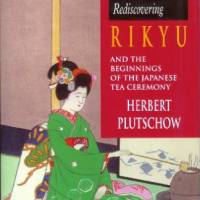It is said that one of the best ways to become a person of culture is to study the Japanese tea ceremony, where nothing is permitted to be rushed and there are no short cuts to accomplishment.
Rediscovering Rikyu and the Beginnings of the Japanese Tea Ceremony, by Hertbert Plutschow
226 pages
Global Oriental, Nonfiction.
Herbert Plutschow's "rediscovery" of the great tea master, Sen-no-Rikyu (1522-91), explores the complex relationship between politics and the arts during the final years of the Warring States era. The author is less interested in Rikyu's achievements and legacy than why his suicide was the inevitable result of the collision of art, politics and ritual. In an object lesson on not mixing politics and aesthetics, Rikyu's relations with the generalissimo Toyotomi Hideyoshi would prove disastrous. An admirer of Rikyu, Hideyoshi exploited the locations of teahouses as venues for secret political meetings, something that must have deeply unsettled the tea master.
Although the reasons remain largely unexplained, Plutschow comes as close as any writer to revealing the truth of Rikyu's death: his position, it seems, his very authority and status, somehow represented a slight to the general, prompting him to order the master to commit seppuku (ritual disembowelment). With typical resignation, and a touch of studied disassociation, Rikyu's death poem, not included in this book, reads: "Seventy years of life/Ha ha! And what a fuss!/With this sacred sword of mine/Both Buddhas and Patriarchs I kill."
Read archived reviews of Japanese classics at jtimes.jp/essential.


















With your current subscription plan you can comment on stories. However, before writing your first comment, please create a display name in the Profile section of your subscriber account page.